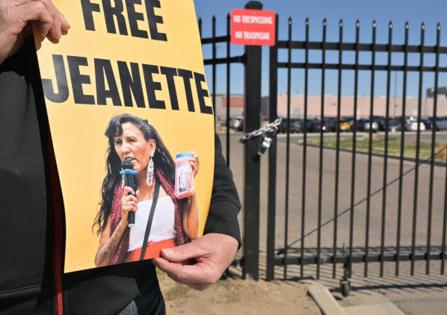Federal attorneys dispute activist Jeanette Vizguerra's right to claim a First Amendment violation in detention challenge
Published in News & Features
DENVER — Federal lawyers urged a U.S. District Court judge in Colorado to reject Jeanette Vizguerra’s challenge of her detention in a new filing this week, arguing that she hasn’t sufficiently shown the government was retaliating against her activism when authorities arrested her.
The well-known immigrant-rights advocate was in the country without proper legal status, and Immigration and Customs Enforcement officers were following a reinstated removal order, U.S. Justice Department attorneys wrote in the Tuesday filing. It responded to arguments by Vizguerra’s legal team in recent weeks that the government’s arrest of Vizguerra in March violated her First Amendment rights.
The federal attorneys counter that, as a noncitizen, Vizguerra can’t argue that her free-speech rights were violated during her arrest, detention and potential deportation from the country.
“The Supreme Court has determined that noncitizens cannot challenge the enforcement of a removal order based on a selective-enforcement theory,” the lawyers wrote, adding that Vizguerra “does not have a viable First Amendment retaliation challenge here.”
The filing was signed by acting U.S. Attorney J. Bishop Grewell and assistant U.S. attorneys Benjamin Gibson, Timothy Jafek and Kevin Traskos. Vizguerra’s attorney, Laura Lichter, didn’t immediately respond to a request for comment Wednesday.
Her attorneys initially filed an emergency petition for a writ of habeas corpus, which is a request to determine the validity of a person’s detention. U.S. District Judge Nina Wang in late March ordered ICE not to deport Vizguerra until her petition was litigated.
The new round of arguments comes over a month after Vizguerra was first detained outside her workplace, a Denver-area Target store, on March 17. She has been held at an ICE detention facility in Aurora.
Vizguerra first crossed the border from Mexico illegally in 1997, and she gained attention nationally for her advocacy after sheltering in two Denver churches to avoid deportation during President Donald Trump’s first term.
Vizguerra’s attorneys have pointed to several examples of what they considered to be retaliatory behavior by the government. Those include a post on the social platform X by the Department of Homeland Security’s assistant secretary for public affairs, Tricia McLaughlin, that said: “We will find, arrest, and deport illegal aliens regardless of if they were a featured ‘Time Person of the Year.’ ”
She was referring to Vizguerra being named one of TIME magazine’s 100 most influential people in the world in 2017, while she was in sanctuary.
Still, the government lawyers wrote that Vizguerra had failed to prove that she wouldn’t have been arrested if she wasn’t an activist and that the users behind those social media accounts were involved in the decision to detain her.
They reasserted a previous argument that this case doesn’t fall within the purview of the District Court and instead should have been filed in the 10th U.S. Circuit Court of Appeals.
Another element of Vizguerra’s case was debated in legal documents this week: her “reasonable fear” screening. That screening is part of a process during a removal order in which an asylum officer assesses the merits of a detainee’s fears about returning to their home country.
Lichter, Vizguerra’s attorney, argued in another Tuesday filing that U.S. Citizenship and Immigration Services didn’t provide Vizguerra or her lawyers with enough notice to prepare on numerous occasions. And she said a guard at the detention center and an asylum officer both tried to mislead Vizguerra during those proceedings.
USCIS ultimately found that Vizguerra did not have what it considered reasonable fears about returning to Mexico because she didn’t answer questions during her interview, according to a separate legal document.
The document included a declaration from Simone Grant, an associate district director for USCIS. The screening interview was rescheduled several times, Grant said, with partial screenings conducted on March 31 and April 11.
Both times, Grant wrote, Lichter allegedly told Vizguerra not to answer any questions and to hang up the phone. She added that Vizguerra’s team was advised that, if she didn’t speak on her behalf, it could result in a negative finding for whether she had credible fears.
On April 14, USCIS issued a negative reasonable fear determination because Vizguerra didn’t provide evidence of the potential for persecution or torture in Mexico, Grant said. She added that, in line with policy, the agency had since referred Vizguerra to an immigration judge to review the findings.
Government attorneys said the decision by USCIS and actions by asylum officers do not relate to ICE, which is a different federal agency.
________
©2025 MediaNews Group, Inc. Visit at denverpost.com. Distributed by Tribune Content Agency, LLC.







Comments